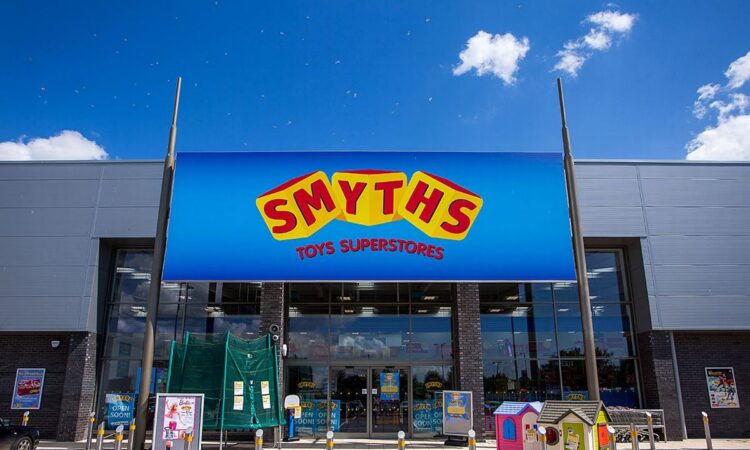
Liam Smyth sadly passed away earlier this year after battling cancer.
In his eulogy, his brother Joe said that Liam’s genius was that he was always moving things forward and advancing projects – whether it was quietly delivering more services to his hometown of Claremorris or in helping scale his family business. “His determination always won through,” Joe said.
Upon his passing, the Claremorris Chamber of Commerce said that Liam had always tried to improve the town’s amenities and create a better place for the people who lived there.
“With his brothers Anthony, Padraic, and Tommie, together they accomplished what few Irish businesses achieve: they grew one shop in a small town into a global giant,” the Chamber said.
This is not hyperbole. Smyths Toys is a remarkable story of ambition, success, and bravery.
From its base in the west of Ireland, Smyths Toys has grown into one of Ireland’s most successful retailing brands. It first cornered the market in Ireland, before becoming the dominant player in the UK. It is now expanding across the continent, after entering Europe in 2008 when it struck a deal to buy 93 former Toys R Us stores spread across Germany, Switzerland, and Austria from the administrators of the bankrupt American retailer.
It has not rested on its laurels: Since then, it has built up a chain of 41 stores in France and three in the Netherlands.
Europe has traditionally been a waste ground for ambitious Irish retailers. Smyths Toys, however, has shown what can be done.
And the company has done it while remaining a resolutely family business, with strong links to the local community from which they come – the family shuns publicity and never courts media attention, but they have been generous to their region.
And it has been achieved in a generation.
I will come to the numbers in a moment. But it is worth reflecting on the origin story, because, as the Claremorris Chamber noted, this home grown multinational – and a multinational is what it is – began from a small shop on main street in Claremorris.
Paddy and Bernadette Smyth ran a newsagents that dabbled in toys. Liam, Joe, along with their siblings Padraig, Tony, Tommie, and Maura, were reared above the shop.
Building on the foundations of their parents, the next generation opened a dedicated toy shop near Eyre Square in Galway in 1986.
Dunnes Stores had a nearby outlet. So too did Roches Stores. Both sold toys, but only really focused on it around Christmas. The Smyth family believed they could outflank them by delivering a full year service.
A move into Limerick set the path forward – a 6,000 square foot property with wide aisles to accommodate trolleys. It was a model that was working in the US with Toys R Us, but the superstore model was new to Ireland.
Slowly, surely, the business became more and more successful. One new shop followed another. Padraig toured the world looking for new trends and new products. Tony, the eldest, took on a senior management role. Liam was in charge of its baby care range.
It invested in new technologies and in new ways of doing things. It has also built a major online presence, investing heavily in its distribution network to ensure quick delivery. It has become a ubiquitous brand for toys in Ireland.
Others sought to follow the market – World of Wonder, for example, expanded heavily around the country but unfortunately came unstuck during the financial crash.
Smyths came through the crash, and, since then, they have thrived. The company’s overall holding entity does not file accounts as it has unlimited status.
But the various divisions of the group that do disclose financial details paint a pretty impressive picture.
Take the UK, for example, where it has more than 110 stores. Accounts filed in recent weeks show that sales increased 16 per cent to stg£910.7 billion (€1.05 billion) as footfall increased last year. Pre-tax profits increased by 8 per cent to £19.4 million. Gross margins increased from 16 per cent to 18 per cent due to what the directors described as a management focus on costs.
It has seven stores in the North. Combined, they generated sales of £56.2 million last year, up 11 per cent on 2021 levels. Pre-tax profits rose 11 per cent to £1.1 million. The company identified key risks as the rise of online retailers, interest rates, and inflation.
In the Republic, where it has 21 stores, it had revenues of €217 million in 2021 and pre-tax profits of €3 million.
The most recently available accounts for its operations in the continent date back to 2020, a year impacted by the pandemic. That year, operations in Austria, Switzerland and Germany generated sales of €475 million with a pre-tax profit of €10.9 million.
And despite the international success, the family behind it remained rooted in their own locality.
In his email yesterday, Tom argued that the government needs to invest heavily in the next generation of start-ups. And he is right; Ireland’s overreliance on a small number of multinationals to shore up the tax base is deeply concerning.
But it is also important to champion the traditional business that have succeeded, such as Smyths Toys. How many family owned companies employ more than 6,000 people and have a network of 280 stores around Ireland, the UK, and Europe?
Companies like Smyths Toys are the cornerstone of the domestic economy. They employ people in towns all over the country, sustainable jobs in provincial towns that need them.
And this toy empire has been built from one of them.
*****

Elsewhere last week, RTE unwrapped its five year plan and received its €56m interim bail-out from the government. Director General Kevin Bakhurst talked to Rosanna in detail on moving the broadcaster to its next phase after the Ryan Tubridy debacle.
A mystery investor with “significant experience in the hospitality industry” is eyeing up the debt-laden Cornstore and Coqbull restaurant chains in Cork and Limerick, which applied for urgent court protection on Tuesday. Francesca had a long read on what went wrong – and what is likely to happen next.
The taxation of share-based remuneration is under review. A recent battle between an executive and the tax authority shows why. Barrister and accountant Eoin O’Shea analysed what it means.
The latest CSO data shows manufacturing output for the third quarter of the year in this country down 23 per cent compared with the same time period last year, and 22 per cent down compared with the previous three-month period. Should we be worried? Not yet, according to Stephen in a thoughtful column.
The first wind farm in Ireland’s race to 80 per cent renewable power returned a 25 per cent margin to its developer. Then the energy world changed. Thomas unpicked the numbers.



